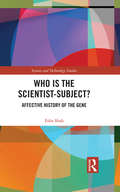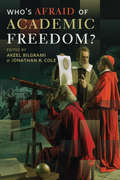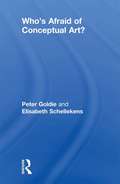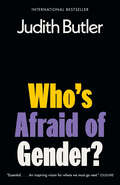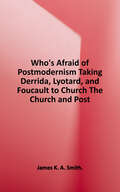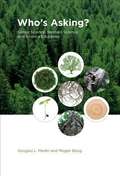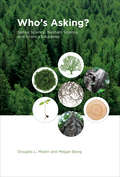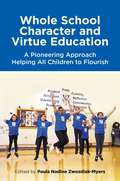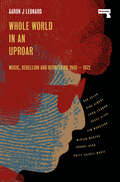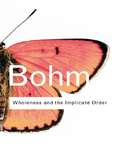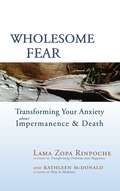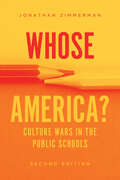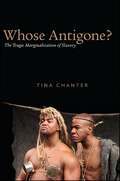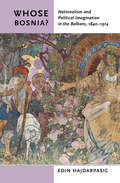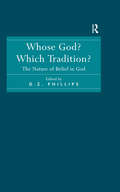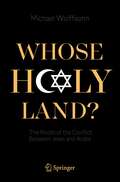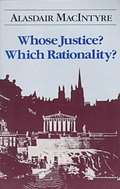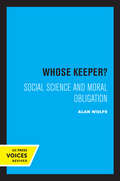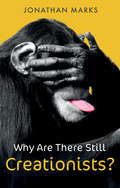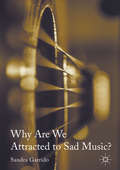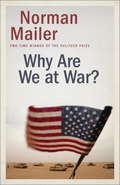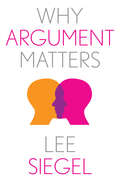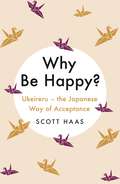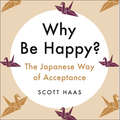- Table View
- List View
Who is the Scientist-Subject?: Affective History of the Gene (Science and Technology Studies)
by Esha ShahThis book explores two disparate sets of debates in the history and philosophy of the life sciences: the history of subjectivity in shaping objective science and the history of dominance of reductionism in molecular biology. It questions the dominant conception of the scientist-subject as a neo-Kantian ideal self – that is, the scientist as a unified and wilful, self-determined, self-regulated, active and autonomous, rational subject wilfully driven by social and scientific ethos – in favour of a narrative that shows how the microcosm of reductionism is sustained, adopted, questioned, or challenged in the creative struggles of the scientist-subject. The author covers a century-long history of the concept of the gene as a series of "pioneering moments" through an engagement with life-writings of eminent scientists to show how their ways of being and belonging relate with the making of the science. The scientist-self is theorized as fundamentally a feeling, experiencing, and suffering subject split between the conscious and unconscious and constitutive of personality aspects that are emotional/psychological, "situated" (cultural and ideological), metaphysical, intersubjective, and existential at the same time. An engaging interdisciplinary interpretation of the dominance of reductionism in genetic science, this book will be of major interest to scholars and researchers of science, history, and philosophy alike.
Who's Afraid of Academic Freedom?
by Jonathan Cole Akeel BilgramiIn these seventeen essays, distinguished senior scholars discuss the conceptual issues surrounding the idea of freedom of inquiry and scrutinize a variety of obstacles to such inquiry that they have encountered in their personal and professional experience. Their discussion of threats to freedom traverses a wide disciplinary and institutional, political and economic range covering specific restrictions linked to speech codes, the interests of donors, institutional review board licensing, political pressure groups, and government policy, as well as phenomena of high generality, such as intellectual orthodoxy, in which coercion is barely visible and often self-imposed.As the editors say in their introduction: "No freedom can be taken for granted, even in the most well-functioning of formal democracies. Exposing the tendencies that undermine freedom of inquiry and their hidden sources and widespread implications is in itself an exercise in and for democracy."
Who's Afraid of Conceptual Art?
by Peter Goldie Elisabeth SchellekensWhat is conceptual art? Is it really a kind of art in its own right? Is it clever – or too clever? Of all the different art forms it is perhaps conceptual art which at once fascinates and infuriates the most. In this much-needed book Peter Goldie and Elisabeth Schellekens demystify conceptual art using the sharp tools of philosophy. They explain how conceptual art is driven by ideas rather than the manipulation of paint and physical materials; how it challenges the very basis of what we can know about art, as well as our received ideas of beauty; and why conceptual art requires us to rethink concepts fundamental to art and aesthetics, such as artistic interpretation and appreciation. Including helpful illustrations of the work of celebrated conceptual artists from Marcel Duchamp, Joseph Kosuth and Piero Manzoni to Dan Perjovschi and Martin Creed, Who’s Afraid of Conceptual Art? is a superb starting point for anyone intrigued but perplexed by conceptual art - and by art in general. It will be particularly helpful to students of philosophy, art and visual studies seeking an introduction not only to conceptual art but fundamental topics in art and aesthetics.
Who's Afraid of Gender?
by Judith ButlerInflamed by the rhetoric of public figures, the "anti-gender ideology movement" has sought to nullify reproductive justice, undermine protections against sexual and gender violence, and strip trans and queer people of their right to pursue a life without fear of violence. Here, Judith Butler, the groundbreaking thinker whose iconic Gender Trouble redefined how we understand gender and sexuality, confronts the attacks on "gender" that have become central to right-wing movements today. Who's Afraid of Gender? examines how "gender" has become a phantasm for emerging authoritarian regimes, fascist formations, and trans-exclusionary feminists. In this vital, courageous book, Butler illuminates the concrete ways in which this phantasm of gender collects and displaces anxieties and fears of destruction, resulting in a movement that demonizes struggles for equality, fuels aggressive nationalism, and leaves millions of people vulnerable to subjugation. An essential intervention into one of the most fraught issues of our moment, Who's Afraid of Gender? is a bold call to refuse the alliance with authoritarian movements and to make a broad coalition with all those who fight against injustice. Imagining new possibilities for freedom and solidarity, Butler offers us a hopeful work of social and political analysis that is both timely and timeless—a book whose verve and rigor only they could deliver.
Who's Afraid of Postmodernism?: Taking Derrida, Lyotard, and Foucault to Church (The Church and Postmodern Culture)
by James K. A. SmithThe philosophies of French thinkers Derrida, Lyotard, and Foucault form the basis for postmodern thought and are seemingly at odds with the Christian faith. However, James K. A. Smith claims that their ideas have been misinterpreted and actually have a deep affinity with central Christian claims. Each chapter opens with an illustration from a recent movie and concludes with a case study considering recent developments in the church that have attempted to respond to the postmodern condition, such as the "emerging church" movement. <p><p>These case studies provide a concrete picture of how postmodern ideas can influence the way Christians think and worship. This significant book, winner of a Christianity Today 2007 Book Award, avoids philosophical jargon and offers fuller explanations where needed. It is the first book in the Church and Postmodern Culture series, which provides practical applications for Christians engaged in ministry in a postmodern world.
Who's Asking?
by Douglas L. Medin Megan BangThe answers to scientific questions depend on who's asking, because the questions asked and the answers sought reflect the cultural values and orientations of the questioner. These values and orientations are most often those of Western science. In Who's Asking?, Douglas Medin and Megan Bang argue that despite the widely held view that science is objective, value-neutral, and acultural, scientists do not shed their cultures at the laboratory or classroom door; their practices reflect their values, belief systems, and worldviews. Medin and Bang argue further that scientist diversity -- the participation of researchers and educators with different cultural orientations -- provides new perspectives and leads to more effective science and better science education. Medin and Bang compare Native American and European American orientations toward the natural world and apply these findings to science education. The European American model, they find, sees humans as separated from nature; the Native American model sees humans as part of a natural ecosystem. Medin and Bang then report on the development of ecologically oriented and community-based science education programs on the Menominee reservation in Wisconsin and at the American Indian Center of Chicago. Medin and Bang's novel argument for scientist diversity also has important implications for questions of minority underrepresentation in science.
Who's Asking?: Native Science, Western Science, and Science Education (The\mit Press Ser.)
by Douglas L. Medin Megan BangAnalysis and case studies show that including different orientations toward the natural world makes for more effective scientific practice and science education.The answers to scientific questions depend on who's asking, because the questions asked and the answers sought reflect the cultural values and orientations of the questioner. These values and orientations are most often those of Western science. In Who's Asking?, Douglas Medin and Megan Bang argue that despite the widely held view that science is objective, value-neutral, and acultural, scientists do not shed their cultures at the laboratory or classroom door; their practices reflect their values, belief systems, and worldviews. Medin and Bang argue further that scientist diversity—the participation of researchers and educators with different cultural orientations—provides new perspectives and leads to more effective science and better science education.Medin and Bang compare Native American and European American orientations toward the natural world and apply these findings to science education. The European American model, they find, sees humans as separated from nature; the Native American model sees humans as part of a natural ecosystem. Medin and Bang then report on the development of ecologically oriented and community-based science education programs on the Menominee reservation in Wisconsin and at the American Indian Center of Chicago. Medin and Bang's novel argument for scientist diversity also has important implications for questions of minority underrepresentation in science.
Whole School Character and Virtue Education: 192
by David Aldridge Carole Jones David Moran Amanda Wyatt Edith Iwobi Angela Flux Jean-Michel Ballay Elenor PaulUsing the successful implementation achieved at Yeading Junior School, this book provides strategies and advice about how to widely implement character education in schools. This helpful guide answers the following questions schools and teachers have when considering how to develop character education:· What character virtues are important in primary education? · How can these be cultivated within the formal and informal curricula? · How do we know if strategies are working and successful? · What constitutes evidence of best practice? With contributions from professional practitioners ranging from building partnerships in the community, intergenerational learning, using character virtues in work with vulnerable children and children with SEND, financial literacy and the diverse religious context of primary education, the book explores the opportunities for developing character virtues and virtue literacy with the purpose of supporting pupils to flourish in society. With the help of this book, schools can create an environment and ethos where learners are not only successful but can make a real difference to the world.
Whole World in an Uproar: Music, Rebellion and Repression – 1955-1972
by Aaron LeonardHow the radical music of the 1960s was birthed amid unprecedented upheaval and systemic repression.Seventy years since the radical music of the 1960s first hit the airwaves, the anthems of the era continue to resonate with our current times. Through studying these musicians and the political contexts in which their pioneering songs were birthed; amidst paranoia, psychedelic delusions, desire and civil unrest; Aaron Leonard&’s Whole World in an Uproar is an important new critical history of countercultural music from the Summer of Love to the unwelcome arrival of Bob Dylan.
Wholeness and the Implicate Order (Routledge Classics)
by David BohmDavid Bohm was one of the foremost scientific thinkers and philosophers of our time. Although deeply influenced by Einstein, he was also, more unusually for a scientist, inspired by mysticism. Indeed, in the 1970s and 1980s he made contact with both J. Krishnamurti and the Dalai Lama whose teachings helped shape his work. In both science and philosophy, Bohm's main concern was with understanding the nature of reality in general and of consciousness in particular. In this classic work he develops a theory of quantum physics which treats the totality of existence as an unbroken whole. Writing clearly and without technical jargon, he makes complex ideas accessible to anyone interested in the nature of reality.
Wholesome Fear
by Lama Thubten Zopa Rinpoche Kathleen McdonaldWith the right perspective, our anxiety around sickness, old age, and death can be a "wholesome fear"--a fear with a positive quality that ultimately enriches and nourishes our lives. Lama Zopa Rinpoche shows us how we can use our anxiety as a high-octane fuel to really live what's most important. Alongside Rinpoche's teachings, Kathleen McDonald presents meditations that lead to peace, compassion, and joy for ourselves and others. Approaching our physical realities in this way will help us to live well and, when the time comes as it inevitably will, to die well too. It's never too early to start making this most important of efforts--and, fortunately, it is never too late. An essential guide for anyone confronting the challenges of death and dying, Wholesome Fear serves as a reminder of the gift and truth of impermanence.
Whose America?: Culture Wars in the Public Schools
by Jonathan ZimmermanIn this expanded edition of his 2002 book, Zimmerman surveys how battles over public education have become conflicts at the heart of American national identity. Critical Race Theory. The 1619 Project. Mask mandates. As the headlines remind us, American public education is still wracked by culture wars. But these conflicts have shifted sharply over the past two decades, marking larger changes in the ways that Americans imagine themselves. In his 2002 book, Whose America?, Zimmerman predicted that religious differences would continue to dominate the culture wars. Twenty years after that seminal work, Zimmerman has reconsidered: arguments over what American history is, what it means, and how it is taught have exploded with special force in recent years. In this substantially expanded new edition, Zimmerman meditates on the history of the culture wars in the classroom—and on what our inability to find common ground might mean for our future.
Whose Antigone?: The Tragic Marginalization of Slavery
by Tina ChanterIn this groundbreaking book, Tina Chanter challenges the philosophical and psychoanalytic reception of Sophocles' Antigone, which has largely ignored the issue of slavery. Drawing on textual and contextual evidence, including historical sources, she argues that slavery is a structuring theme of the Oedipal cycle, but one that has been written out of the record.Chanter focuses in particular on two appropriations of Antigone: The Island, set in apartheid South Africa, and Tègònni, set in nineteenth-century Nigeria. Both plays are inspired by the figure of Antigone, and yet they rework her significance in important ways that require us to return to Sophocles' "original" play and attend to some of the motifs that have been marginalized. Chanter explores the complex set of relations that define citizens as opposed to noncitizens, free men versus slaves, men versus women, and Greeks versus barbarians. Whose Antigone? moves beyond the narrow confines critics have inherited from German idealism to reinvigorate debates over the meaning and significance of Antigone, situating it within a wider argument that establishes the salience of slavery as a structuring theme.
Whose Bosnia?: Nationalism and Political Imagination in the Balkans, 1840–1914
by Edin HajdarpasicAs the site of the assassination that triggered World War I and the place where the term "ethnic cleansing" was invented during the Yugoslav Wars of the 1990s, Bosnia has become a global symbol of nationalist conflict and ethnic division. But as Edin Hajdarpasic shows, formative contestations over the region began well before 1914, emerging with the rise of new nineteenth-century forces—Serbian and Croatian nationalisms as well as Ottoman, Habsburg, Muslim, and Yugoslav political movements—that claimed this province as their own. Whose Bosnia? reveals the political pressures and moral arguments that made this land a prime target of escalating nationalist activity. To explain the remarkable proliferation of national movements since the nineteenth century, Hajdarpasic draws on a vast range of sources—records of secret societies, imperial surveillance files, poetry, paintings, personal correspondences—spanning Bosnia, Serbia, Croatia, Turkey, and Austria. Challenging conventional readings of Balkan histories, Whose Bosnia? provides new insight into central themes of modern politics, illuminating core subjects like "the people," state-building, and national suffering. Hajdarpasic uses South Slavic debates over Bosnian Muslim identity to propose a new figure in the history of nationalism: the (br)other, a character signifying at the same time the potential of being both "brother" and “Other,” containing the fantasy of both complete assimilation and insurmountable difference. By bringing such figures into focus, Whose Bosnia? shows nationalism to be an immensely dynamic and open-ended force, one that eludes any clear sense of historical closure.
Whose God? Which Tradition?: The Nature of Belief in God
by D. Z. PhillipsPhilosophy of Religion is marked by controversy over which philosophical accounts do justice to core religious beliefs. Many Wittgenstinian philosophers are accused by analytic philosophers of religion of distorting these beliefs. In Whose God? Which Tradition?, the accusers stand accused of the same by leading philosophers in the Thomist and Reformed traditions. Their criticisms alert us to the dangers of uncritical acceptance of dominant philosophical traditions, and to the need to do justice to the conceptual uniqueness of the reality of God. The dissenting voices breathe new life into the central issues concerning the nature of belief in God.
Whose Holy Land?: The Roots of the Conflict Between Jews and Arabs
by Michael WolffsohnThis book explains the historical roots of the conflict between Jews and Arabs, which has lost none of its explosiveness to the present day, in a comprehensive and easy-to-understand manner. The question of who owns the Holy Land is more relevant today than ever. The debates on this topic are often characterized by ignorance and strong emotions, while partiality and power interests still obscure the view on the political situation in the Middle East. Shaking up old myths and prejudices, this book presents an overall historical as well as political analysis of the Jewish, Christian, and Muslim structures, actors, and actions from the very beginning to this very day, as well as a topical analysis. It combines history with theology and political science. Thus, the book is a must-read for scholars and students of political science, history, and international relations, as well as policy-makers, interested in a better understanding of the historical background and current political situation in the Middle East.
Whose Justice? Which Rationality?
by Alasdair MacintyreWhose Justice? Which Rationality?, the sequel to After Virtue, is a persuasive argument of there not being rationality that is not the rationality of some tradition. MacIntyre examines the problems presented by the existence of rival traditions of inquiry in the cases of four major philosophers: Aristotle, Augustine, Aquinas, and Hume.
Whose Keeper?: Social Science and Moral Obligation
by Alan WolfeWhose Keeper? is a profound and creative treatise on modernity and its challenge to social science. Alan Wolfe argues that modern liberal democracies, such as the United States and Scandinavia, have broken with traditional sources of mortality and instead have relied upon economic and political frameworks to define their obligations to one another. Wolfe calls for reinvigorating a sense of community and thus a sense of obligation to the larger society. This title is part of UC Press's Voices Revived program, which commemorates University of California Press’s mission to seek out and cultivate the brightest minds and give them voice, reach, and impact. Drawing on a backlist dating to 1893, Voices Revived makes high-quality, peer-reviewed scholarship accessible once again using print-on-demand technology. This title was originally published in 1989.
Why Are There Still Creationists?: Human Evolution and the Ancestors
by Jonathan MarksThe evidence for the ancestry of the human species among the apes is overwhelming. But the facts are never “just” facts. Human evolution has always been a value-laden scientific theory and, as anthropology makes clear, the ancestors are always sacred. They may be ghosts, or corpses, or fossils, or a naked couple in a garden, but the idea that you are part of a lineage is a powerful and universal one. Meaning and morals are at play, which most certainly transcend science and its quest for maximum accuracy. With clarity and wit, Jonathan Marks shows that the creation/evolution debate is not science versus religion. After all, modern anti-evolutionists reject humanistic scholarship about the Bible even more fundamentally than they reject the science of our simian ancestry. Widening horizons on both sides of the debate, Marks makes clear that creationism is a theological, not a scientific, debate and that thinking perceptively about values and meanings should not be an alternative to thinking about science – it should be a key part of it.
Why Are We Attracted to Sad Music?
by Sandra GarridoIn this book, perspectives in psychology, aesthetics, history and philosophy are drawn upon to survey the value given to sad music by human societies throughout history and today. Why do we love listening to music that makes us cry? This mystery has puzzled philosophers for centuries and tends to defy traditional models of emotions. Sandra Garrido presents empirical research that illuminates the psychological and contextual variables that influence our experience of sad music, its impact on our mood and mental health, and its usefulness in coping with heartbreak and grief. By means of real-life examples, this book uses applied music psychology to demonstrate the implications of recent research for the use of music in health-care and for wellbeing in everyday life.
Why Are We at War?
by Norman MailerBeginning with his debut masterpiece, The Naked and the Dead, Norman Mailer has repeatedly told the truth about war. Why Are We at War? returns Mailer to the gravity of the battlefield and the grand hubris of the politicians who send soldiers there to die. First published in the early days of the Iraq War, Why Are We at War? is an explosive argument about the American quest for empire that still carries weight today. Scrutinizing the Bush administration's words and actions, Mailer unleashes his trademark moral rigor: "Because democracy is noble, it is always endangered. . . . To assume blithely that we can export democracy into any country we choose can serve paradoxically to encourage more fascism at home and abroad."
Why Argument Matters (Why X Matters Series)
by Lee SiegelAn impassioned case for argument&’s central role in human life, by one of America&’s most distinguished cultural critics &“An invigorating reflection on the nature and value of disagreement. . . . Sharp and taut. . . . A lesson in a well-constructed argument itself.&”—Publishers Weekly, starred review &“Perhaps more than any other commentary, Why Argument Matters illuminates the root causes of our partisan, venomous, irrational times—and yet somehow rescues from the morass the true nature of argument, its power and beauty.&”—Michael Wolff, author of Fire and Fury: Inside the Trump White House From Eve&’s crafty exchange with the serpent, to Martin Luther King&’s soaring, subtle ultimatums, to the throes of Twitter—argument&’s drainpipe—the human desire to prevail with words has been not just a moral but an existential compulsion. In this dazzling reformulation of argument, renowned critic Lee Siegel portrays the true art of argument as much deeper and far more embracing than mere quarrel, dispute, or debate. It is the supreme expression of humanity&’s longing for a better life, born of empathy and of care for the world and those who inhabit it. With wit, passion, and striking insights, Siegel plumbs the emotional and psychological sources of clashing words, weaving through his exploration the untold story of the role argument has played in societies throughout history. Each life, he maintains, is an argument for that particular way of living; every individual style of argument is also a case that is being made for that person&’s right to argue. Argument is at the heart of the human experience, and language, at its most liberated and expressive, inexorably bends toward argument.
Why Be Happy?: The Japanese Way of Acceptance
by Scott HaasThis beautiful and practical guide to ukeireru, the Japanese principle of acceptance, offers a path to well-being and satisfaction for the anxious and exhausted.Looking for greater peace and satisfaction? Look no further than the Japanese concept of ukeireru, or acceptance. Psychologist Scott Haas offers an elegant, practical, and life-changing look at ways we can reduce anxiety and stress and increase overall well-being. By learning and practicing ukeireru, you can:Profoundly improve your relationships, with a greater focus on listening, finding commonalities, and intuitingFind calm in ritualizing things such as making coffee, drinking tea, and even having a cocktailEmbrace the importance of baths and napsShow respect for self and others, which has a remarkably calming effect on everyoneLearn to listen more than you talkTidy up your life by downsizing experiences and relationships that offer more stress than solaceCultivate practical ways of dealing with anger, fear, and arguments -- the daily tensions that take up so much of our livesBy practicing acceptance, we learn to pause, take in the situation, and then deciding on a course of action that reframes things. Why Be Happy? Discover a place of contentment and peace in this harried world.
Why Be Happy?: The Japanese Way of Acceptance
by Scott HaasThis book offers a path to well-being and satisfaction for the anxious and exhausted and anyone charmed by concepts such as hygge, ikigai, and wabi sabi. Psychologist Scott Haas spends much of his time in Japan, and with this book he provides a host of delightful examples of the way he has been made welcome, accepted and happy in this distant country, as well as many thought provoking and practical lessons which you can apply.WHY BE HAPPY? will help make your world a happier place by discovering a place of contentment and peace amid the chaos of modern life.
Why Be Happy?: The Japanese Way of Acceptance
by Scott HaasThis book offers a path to well-being and satisfaction for the anxious and exhausted and anyone charmed by concepts such as hygge, ikigai, and wabi sabi. Psychologist Scott Haas spends much of his time in Japan, and with this book he provides a host of delightful examples of the way he has been made welcome, accepted and happy in this distant country, as well as many thought provoking and practical lessons which you can apply.WHY BE HAPPY? will help make your world a happier place by discovering a place of contentment and peace amid the chaos of modern life.(P)2020 Hachette Audio
